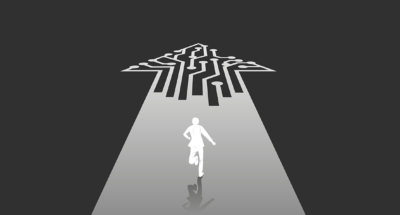
Brain Circuits
Man vs Machine: How to realize the power of intuition
by Patrick Reinmoeller Published November 15, 2024 in Brain Circuits • 3 min read
As algorithms increasingly populate our environment, we need to think for ourselves even more. The way to do this is through harnessing the power of intuition – which begins by understanding the difference between human and machine intelligence.
Intuition is not inferior to logic
The idea that decisions should always be based on hard facts is deep-rooted in the business world – but this misunderstands the nature of intuition and how to apply it to decision-making. Rather than an ill-informed ‘hunch’, intuition is a form of unconscious intelligence; one shaped by experience in dealing with uncertain and dynamic situations. Algorithms can only infer ‘solutions’ from known events and are often ill-suited for dealing with uncertainty.
Heuristics: decision-making during uncertainty
Heuristics are mental shortcuts that serve as rules for decision-making and can help solve problems and make decisions quickly. They are concrete rules about what to do in response to a particular situation. They can be conscious or unconscious; explicit or implicit. The latter are heuristics that people are not aware of or haven’t qualified yet – a form of unconscious intelligence based on experience. In drawing on experience, we sense quickly what we should or should not do in a particular situation and make a decision. The result is conscious (and often seems instantaneous), but we don’t know how we got there because the underlying process is unconscious.
Another advantage of using heuristics concerns transparency. With AI-based decisions, you don’t know what data has been used to produce a result. By contrast, making the intuition that underlies your heuristic explicit makes for full transparency. This can be a powerful tool in business, especially for leaders.
Knowing which heuristics (rules) to use and when is a function of experience and judgment. If the environment has changed, the rules for making decisions need to change – there has to be a match between the environment and behavior.
Everyone has intuitions
Intuition is not something that only certain people have – everyone has good intuition if they have long experience in a certain field or environment. Ultimately, by making intuitive decisions, we are focusing on what is important in a given scenario and ignoring everything else – whether it’s being chased by a bear or tackling a business problem. It’s about having the courage to ignore what doesn’t matter and focus on what does.
Key learning
Digitalization surrounds us and permeates our every activity. While AI brings us undoubted benefits, its results can make for confusion and uncertainty. The way to respond is by using human intuition to outsmart the smart world.
Authors

Patrick Reinmoeller
Professor of Strategy and Innovation at IMD
Patrick Reinmoeller has led public programs on breakthrough strategic thinking and strategic leadership for senior executives, and custom programs for leading multinationals in fast moving consumer goods, telecommunications, pharmaceuticals, healthcare, and energy on developing strategic priorities, implementing strategic initiatives, and managing change. More recently, his work has focused on helping senior executives and company leaders to build capabilities to set and drive strategic priorities.
Related

Moving sustainability business decisions from the periphery to the core
17 hours ago in Brain Circuits
While sustainability is indeed becoming more important for boards and executives around the world, this is not yet a sign that co-creation of commercial and societal value in a firm’s decision-making is...

Why your well-being initiatives aren’t working – and how to fix them
May 23, 2025 in Brain Circuits
It takes more than a few yoga classes to tackle the problems of burnout, financial stress, and poor mental and physical health. Consult the checklist to gauge the effectiveness of your current...

Lessons in digital transformation from industry
May 22, 2025 in Brain Circuits
In an interview with IMD’s Didier Bonnet, aerospace veteran Mike Ambrose shared his insights on pulling off a successful digital transformation in one of the world’s most complex industries....